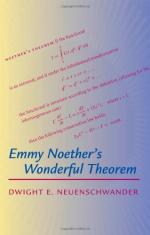|
This section contains 347 words (approx. 2 pages at 300 words per page) |
World of Scientific Discovery on Amalie Emmy Noether
Noether, better known by her nickname of Emmy, had originally planned to be a teacher of English and French, but she changed her career plans to follow in the footsteps of her well-respected father, Max Noether, then a professor of mathematics at the University of Erlanger. While she excelled at her school studies, German educational policy barred women from becoming full-fledged university students. Undaunted, Noether attended lectures in language and mathematics for two years without being admitted as a student. Eventually she was granted an exception to the policy and awarded a doctorate in 1907; her thesis dealt with algebraic invariants. It was about this time a new type of algebra, abstract algebra, began to emerge. It was these areas of mathematics Noether chose to pursue. After graduating, rules and regulations once again hindered Noether, this time prohibiting her from taking a teaching position at the university, although she persisted independently in her own mathematical research. In 1915 she was invited by a fellow mathematician, David Hilbert, to lecture at Göttingen University. Four years later, with the help of a persistent Hilbert, Noether was finally granted the status of a Privatdozent (a licensed lecturer who could received fees from her students but not from the university). In 1922 she was made an "unofficial associate professor".
Noether prospered at Göttingen University, producing many important papers on such topics as finite bases and non-commutative algebra. Noether was also successful in mathematically generalizing Albert Einstein's theory of relativity. Her formulations, linking the concepts of symmetry and conservation, had applications in many areas of theoretical physics. In addition, Noether produced a significant body of work on ring theory and the concept of ideals--a theory that came to be an essential part of abstract algebra.
When the Nazis dismissed Jewish academics in 1933, Noether left Germany and moved to the United States. She became professor of mathematics at Bryn Mawr College in Pennsylvania, where she died from a post-surgical infection in April 1935. Noether is remembered both for her brilliant mathematical ability and her determination to overcome sexual and racial discrimination.
|
This section contains 347 words (approx. 2 pages at 300 words per page) |


